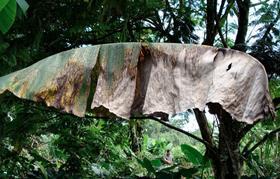
Climate change is having an adverse effect on banana production in Latin America, a British researcher has warned.
Dr Dan Bebber, a senior lecturer in biosciences at Exeter University, told last week's International Banana Congress in Miami that as the planet warms, organisms shift north and south away from the equator. This is having an impact on production in Central and South America as the potential of diseases to spread increases.
Since 1958, studies have shown that temperatures have become warmer and therefore more suited to the spread of disease, Bebber said. 'Over time larger parts of Latin America have become more conducive to infection,' he affirmed.
Between the 1960s and today Venezuela saw a 200 per cent rise in plant disease risk, with the risk also increasing substantially in key banana-producing nations such as Costa Rica, Ecuador and Colombia, as well as in Bolivia, Brazil and Mexico.
Only Guatemala and Honduras saw a decreased infection risk, in response to the fact the two countries are getting drier.
Major banana threat black sigatoka was first carried to Honduras from Asia in 1972, Bebber pointed out, with the disease fully spreading across the region by 2010. Wind and water are thought to have been the key carriers for the spread.
Bebber said more work still needs to be done to fully understand the impact of climate change on banana production, but that the key trends are quite clear.



